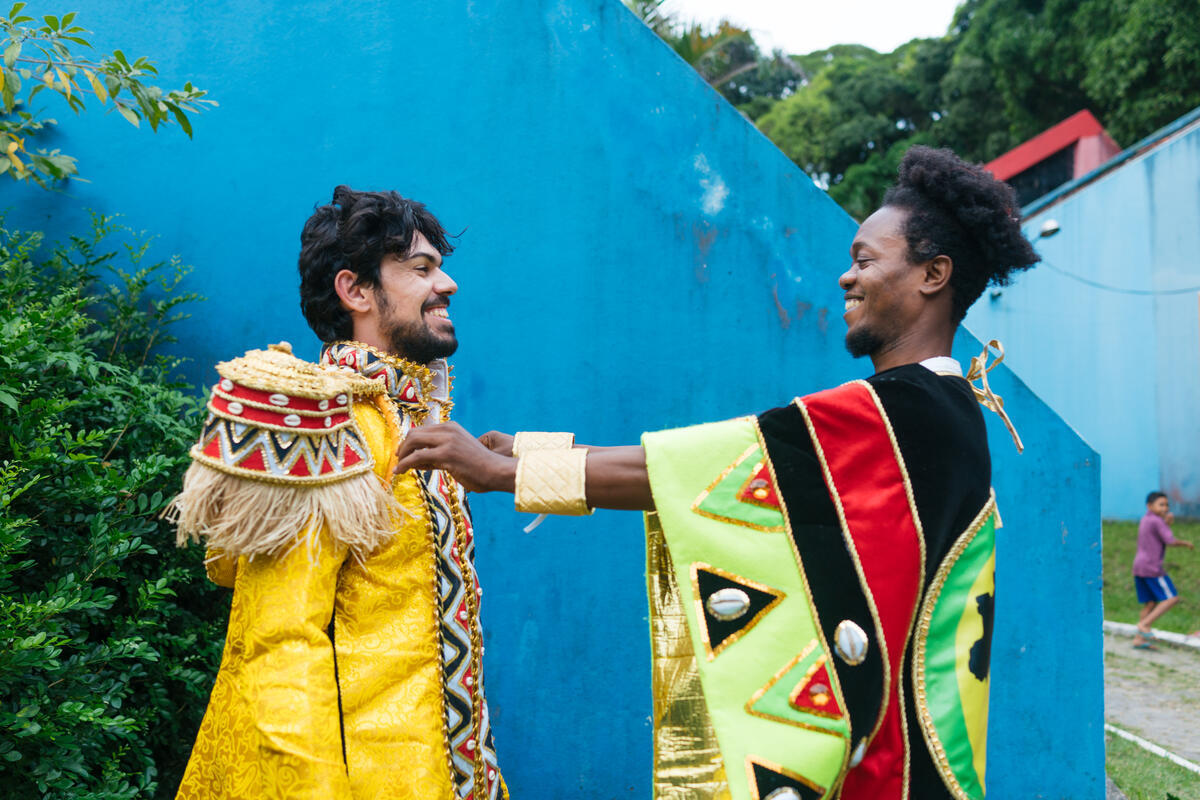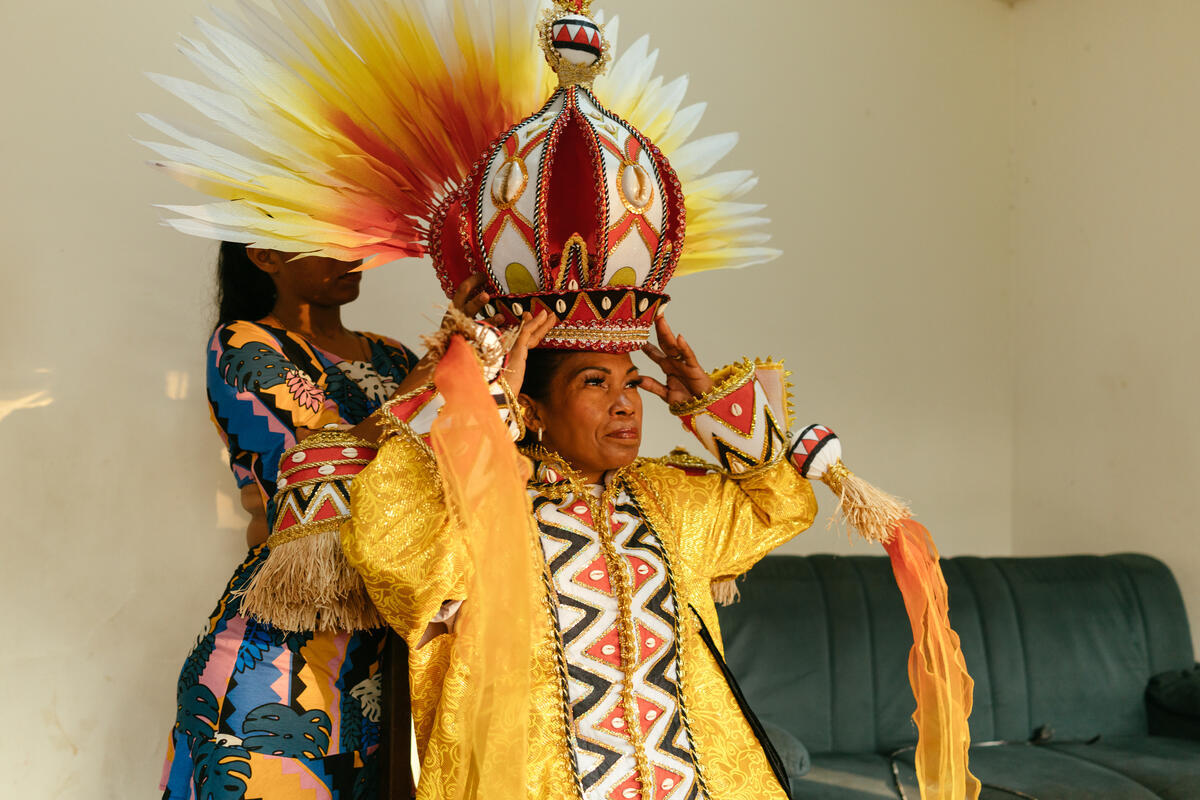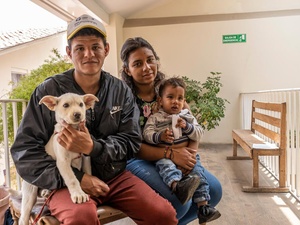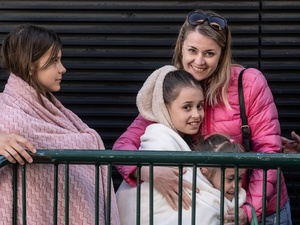Refugees samba in Rio's famed Carnival parade to celebrate Brazilian openness

Refugees samba in Rio's famed Carnival parade to celebrate Brazilian openness
On a recent Friday night, a potent cocktail of excitement, nerves and pent-up energy filled the midsummer air at Rio de Janeiro’s world-famous Sambadrome, as decked out performers from the Salgueiro samba school and their fans waited for the annual parade to begin.
For 20 performers, the moment was particularly thrilling. Refugees from Syria, Venezuela, Angola and the Democratic Republic of the Congo, they could hardly believe they were about to take part in perhaps the most Brazilian of all events – the all-night-explosion of music, drumming, dancing and creativity that is Rio’s annual Carnival parade competition.
The Salgueiro samba school, whose theme for this year’s parade was the fight against racism, invited the 20 refugees as part of a partnership with UNHCR, the UN Refugee Agency, to promote integration of refugees into the country. Brazil is home to recognized refugees from 88 countries and has received an estimated 325,000 refugees and migrants from its neighbour to the north, Venezuela, in recent years.
“For most people, being a refugee seems like something sad, but this is pure happiness,” said Yves Abdalá, a 30-year-old Congolese refugee, panting after dancing his way down the Sambadrome in a Rastafarian-inspired costume that was as ornate as it was heavy.
“Performing with other refugees from around the world filled me with energy.”

Yves Abdalá helped his fellow refugee, Syrian Adel Bakkour, put the finishing touches on his costume before the two headed to the Sambadrome.
The event not only showcased the adaptability of refugees – after all, mastering samba’s fancy footwork is an achievement in and of itself – but also helped bring the performers closer to their new country and its traditions. Rio’s samba school parade is serious business, and the schools are judged on a series of technical criteria, including performers’ dance skills. Participants commit to attending regular rehearsals that stretch well into the night and to learning – and belting out – the school’s song.
“For most people, being a refugee seems like something sad, but this is pure happiness.”
For Adel Bakkour, a 29-year-old refugee who arrived in Brazil a decade ago after fleeing the war in his native Syria, taking part in Saturday’s parade represented the crowning achievement of a difficult journey to safety. Adel was living a comfortable life in Aleppo, attending a private high school, when the conflict broke out. He and his brother fled, heading for Brazil, where their half-sister lived.
Although they were lucky to have family abroad who could receive them, adjusting to their new life was not easy. Living under the same roof as their 40-year-old half-sister, with whom the pair had had little contact, proved fraught. Also, back in Syria, Adel had been an excellent student, but Brazilian Portuguese was daunting, and his grades suffered as he struggled to master the language.
Over the past few years, however, Adel has become an unofficial spokesperson for Rio’s Syrian community at the university where he’s working toward an undergraduate degree in international relations. He assumed a similar role during the lead up to the parade, fielding interviews with Brazilian media outlets. At the rehearsals, he struck up friendships with his fellow performers, both the other refugees and Brazilians from all walks of life.
“One of my Syrian friends saw how excited I was with the rehearsals, and she says she wants to us both join Salgueiro next year,” he said.

Just a few months after her arrival in Rio, Venezuelan refugee Ingrid Bucán gets ready to make her debut in the city's famed Carnival parade.
Ingrid Bucán, a 47-year-old hair stylist who sold everything in order to flee her native Venezuela, said the parade confirmed her warm feelings about Brazil. She arrived in the country in 2020 with her husband and several of their children as well as four grandchildren and has received assistance in getting back on her feet, including Portuguese lessons and sessions with a therapist.
She and her family were among the more than 72,000 Venezuelans who have been resettled from the remote Amazonian state of Roraima to other parts of the country as part of a programme run by the Brazilian government, with support from UNHCR, to help give them better access to jobs and housing.
“Dancing alongside other refugees made me so grateful.”
Although she admits that learning to samba proved particularly hard, Ingrid said she could not think of a better way to celebrate her arrival in her new hometown, Rio, than by striding down the Sambadrome in company of thousands of Brazilians, as well as her fellow refugees. And because Salgueiro came in sixth place in the samba school competition, Ingrid and her fellow performers get the chance to take to the Sambadrome once again, as part of the champions’ parade held a week later.
“Brazil has taught me so much. Even just learning another language changes your life,” said Ingrid, donning a flamboyant costume in canary yellow with oversized epaulettes. “I’m proud to have represented all the refugees of the world in Carnival…. Dancing alongside other refugees from around the world made me so grateful.”









